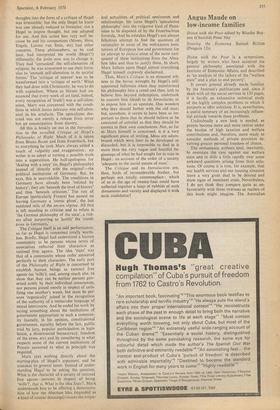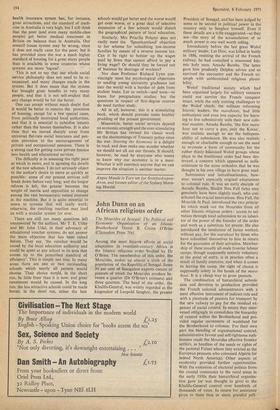Angus Maude on low-income families
Steering the Economy Samuel Brittan (Penguin 12s)
Down with the .Poor is a symposium, largely by writers who have accepted the general philosophy associated with the Institute of Economic Affairs, and described as 'an analysis of the failure of the "welfare state" and a plan to end poverty'.
It covers ground already made familiar by the Institute's publications and, since it deals with all the social services in 130 pages, it is hardly an exhaustive technical study of the highly complex problems to which it purports to offer solutions. It is, nevertheless, a useful summary of an increasingly influen- tial attitude towards these problems.
Undoubtedly a new look is needed, as people become more and more restive under the burden of high taxation and welfare contributions and, therefore, more ready to consider methods of private provision in- volving greater personal freedom of choice.
The enthusiastic authors tend, inevitably, to overstate the case against our welfare state and to slide a little rapidly over some awkward questions arising from their solu- tions. Of course it is true, for example, that our health services and our housing situation leave a very great deal to be desired and show signs of imminent crisis. Nevertheless, I do not think they compare quite as un- favourably with those overseas as readers of this book might imagine. The Australian
health insurance system has, for instance, great attractions, and the standard of medi- cine in Australia is very high; but I still think that the poor (and even many middle-class people) get better medical treatment in Britain on balance than in Australia. Our council house system may be wrong, since it does not really cater for the poor; but it has provided since the war a much higher standard of housing for a great many people than is available in some countries whose systems are more 'logical'.
This is not to say that our whole social service philosophy does not need to be re- examined, and many changes made in the system. But it does mean that the system has brought great benefits to very many people, and that it is not self-evident that any change would be for the better.
One can accept without much doubt that it would be better to remove the provision of housing, except for a few special cases, from politically motivated local authorities, and that it is essential to subsidise tenants rather than the houses themselves. It is also time that we moved sharply away from universal flat-rate social insurance and pen- sion provision to the encouragement of private and occupational pensions. There is a strong case for getting more private finance into health and educational services.
The difficulty is in assessing the right pace at which to move, and in agreeing the details of the new schemes. I do not seriously object to the author's desire to move as quickly as possible: some of our present services will break down before very long; and the longer reform is left, the greater becomes the weight of inertia and opposition to change among the vast bureaucratic vested interests in the machine. But it is quite essential to move to systems that will really work; otherwise, the resulting reaction may land us with a socialist system for ever.
There are still too many questions left unanswered by the authors. Mr T. E. Utley and Mr John Udal, in their advocacy of educational voucher systems, do not answer the main objection that has been raised before. They say, 'the voucher would be issued by the local education authority and could be spent at any school in its area that comes up to the prescribed standard of efficiency'. This is simply not true. In many areas there are one or two outstanding schools which nearly all parents would choose. Their choice would, in the short run, be little freer than it is now, and great resentment would be caused. In the long run, the less attractive schools could be made better; in the short run, either the best schools would get better and the worse would get even worse, or a great deal of selective expansion of a few schools would distort the geographical pattern of local education.
Similarly, Mrs Priscilla Polanyi does not really meet the 'Speenhamland' objection to her scheme for subsidising low-income families by means of a reverse income tax. Can it be right to bolster up the wages paid by firms that cannot afford to pay a living wage? Or should they be forced out of business by shortage of workers?
Nor does Professor Richard Lynn con- vincingly meet the psychological objections to sending young university graduates out into the world with a burden of debt from student loans. Let us switch—and soon—to loans for postgraduate studies; but the questions in respect of first-degree courses do need further study.
All in all, however, this is a stimulating book, which should provoke some healthy prodding of the present government.
Meanwhile, better social services depend on economic strength and the ever-stimulating Mr Brittan has revised his classic work on the shortcomings of Treasury policy since the war. Steering the Economy is a delight to read, and does make one wonder whether we should not all cut our throats. It should, however, be read by everyone who wants to know why our economy is in a mess. Whether it will convince anyone that we can improve the situation is another matter.
Angus Maude is Tory MP for Stratford-upon- Avon, and former editor of the Sydney Morn- ing Herald.



































 Previous page
Previous page